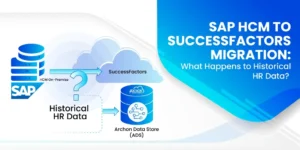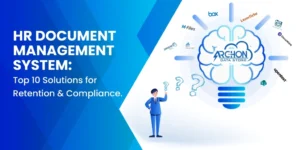Organizations that face SAP data growth at a rapid pace often struggle to make efficient decisions while operating at a large scale. In this context, data archival could play a pivotal role in managing SAP data effectively. However, SAP data archival implementation is a highly complex process that is resource and time-intensive. Working with the right SAP archiving partner will bring significant reductions in cost and help avoid project delays.
An implementation partner should understand the business context and be able to devise strategies to maneuver around the intricacies of SAP systems. In this blog, let us explore the key considerations that a business should have before choosing its SAP partner.
Your Checklist for Identifying the Right SAP Archiving Partner
To ensure your potential SAP archiving partner can meet your company’s specific requirements and goals, several factors must be considered. This checklist outlines the key steps in evaluating potential partners.
Define Your Requirements
Establishing clear archiving needs is the first step. This helps you to streamline the archiving process. If your requirements can be identified early on, security risks can be proactively mitigated, spending can be more appropriately allocated, and unexpected issues can be avoided when approaching archival in this manner. Some important considerations during this step include:
- Data Volume and Types: Identify the amount and types of data to be archived. Evaluate your infrastructure from the ground up. This is an opportunity to clean up redundant and unnecessary data repositories as well as reduce storage & processing overhead and associated costs.
- Integration Needs: Determine integration requirements with other SAP modules or external systems. This expedites the archival process by ensuring you’re fully prepared for challenges that may arise.
- Budgetary Constraints: Outline your budget for archiving solutions. Don’t forget to factor in the cost savings associated with archival in the end.
- Performance Expectations: Specify the performance standards you expect. Is it imperative to avoid downtime? Do you need to maintain service and data availability continuously, or is there a maintenance period in which you can incrementally archive data?
- Compliance and Regulatory Concerns: Ensure the solution meets all legal and regulatory requirements. These can be internal to your organizational security policies but should also accommodate local or global compliance standards.
Research Potential Partners
There are several vendors to partner with, but it’s important to be selective in your choice to ensure efficient spending and appropriately address risk throughout the archival process. Luckily, you can explore prospective vendors using a variety of resources:
- Web Resources and Trade Journals: Look for vendors with a solid online presence and industry recognition.
- Client Testimonials and Recommendations: Seek testimonials and recommendations from trusted sources. Gartner and G2 are both trusted sources that can be referenced for comparisons of different archival solutions, but you can also verify if the vendor offers any customer success articles or other forms of client testimonials.
- Client References: Contact references to understand their satisfaction and the partner’s ability to meet unique needs. Lists of references can be specifically requested from vendors; while sensitive information cannot always be provided, it’s worth finding out if any details can help in your research.
Evaluate Expertise and Experience SAP Archiving Partner
Your data must remain in safe hands to avoid bigger issues down the line. Assess the expertise and experience of potential partners:
- Domain Expertise: Evaluate the vendor’s experience in the SAP archiving domain. A partner with extensive experience and a proven track record can provide insights and solutions that are tailor-made to meet customer expectations along with specific industry needs. This experience can significantly reduce implementation risks and ensure smoother integration.
- Technical Skills and Certifications: Ensure they have skilled personnel and certified consultants. Check for experience and clients listed on the vendor website or ask for a description of the experience the vendor has had. It can be especially useful to ask if the vendor has dealt with any use cases like yours.
- SAP Archiving Projects: Look for experience in implementing numerous SAP archiving projects. Again, this can often be found within the vendor’s blog or a specific location on their website. However, you can always specifically request information as well if it isn’t explicitly listed.
- SAP Best Practices: Verify their understanding and application of SAP best practices and technology. This can be done by reviewing the vendor’s blog, social media content, and other external resources. If there’s nothing present, there isn’t as much evidence supporting the vendor’s credibility. However, you can always ask the vendor targeted questions to determine their level of comfortability and expertise in SAP archiving, just in case.
- Assess Technology and Solutions: There are usually different services, products, and solutions available that can address your SAP archiving needs. Take some time to examine and understand the technology and solutions offered, and evaluate for:
- Performance and Scalability: Ensure the solutions are scalable and perform well. Will the solution be able to accommodate the volume of data you have to archive?
- Security Features: Check for security measures. Will your explicit requirements and expectations be able to be addressed?
- Integration Potential: Ensure smooth integration with your existing systems. Often, there is a list of supported technologies, but this information can always be specifically requested from the vendor as well.
- Compliance Support: Verify support for legal and regulatory compliance. Can they accommodate audit requirements? Is the data able to be easily accessed as historical records?
Consider Support and Maintenance
Different vendors accommodate different support packages and services, ranging from supporting you in archiving to supporting through archiving your data for you. Valuate the level of support and maintenance provided:
- Software Upgrades: Check if they provide regular updates and upgrades. Reach out and determine how quickly updates are supported after release.
- Troubleshooting Services: Check for reliable troubleshooting support. Is the availability of support sufficient for your organizational needs?
- Ongoing Technical Assistance: Ensure long-term technical support availability. Are there training services provided to help your teamwork within the new archive? Is the team willing to help with continuous improvements, upgrades, and archival?
Evaluate Pricing and ROI
Earlier, you set your budget constraints and considered the tradeoff between spending and the eventual gain obtained from archival. It’s now time to apply that to your search for the right SAP archiving partner. Compare pricing and licensing structures:
- Total Cost of Ownership: Consider implementation costs, licensing fees, and ongoing maintenance costs.
- Return on Investment (ROI): Assess potential ROI from improved productivity, cost savings, and compliance.
Conduct Interviews and Demos
Getting in touch with the prospective vendor is essential for evaluation. Arrange interviews and demonstrations with the right SAP archiving partners to cover the following:
- Product Demonstrations: Evaluate their solutions through live demos.
- In-depth Discussions: Discuss your specific needs and assess their responsiveness and communication skills.
Consider Long-Term Relationship SAP Archiving Partner
Choose a partner ready for a long-term relationship. What is their outlook and how do they handle communications?
- Adaptability: Ensure they can adapt to your evolving needs. Compare their service and product offerings against what you eventually need to accommodate, as well as what’s needed now.
- Collaborative mindset: Look for partners willing to work closely with you. Are they willing to provide personalized guidance and support?
- Commitment to Success: Ensure their commitment to your company’s success. Can customized solutions be provided, if necessary, to accommodate your unique needs?
Ready to start your SAP archiving process?
Following these steps and conducting thorough due diligence will help in identifying the right SAP archiving partner to implement a successful archiving solution that meets your organization’s needs, objectives, and budget constraints.
Platform 3 Solutions exemplifies the ideal SAP archiving partner by offering tailored SAP archiving services to optimize your environment, reduce costs, improve performance, and ensure compliance. Our team of experts are globally distributed, and accredited, and have years of experience in data archival, migrations, and decommissioning. Learn more about our SAP Archiving Services and connect with us for a free consultation, anytime, through our Contact Us page.
Platform 3 Solutions is a global leader in end-to-end legacy application migration and retirement solutions. Platform 3 empowers secure and seamless transitions of data and applications, eliminates technology debt, and delivers the ROI to invest in technology modernization.



